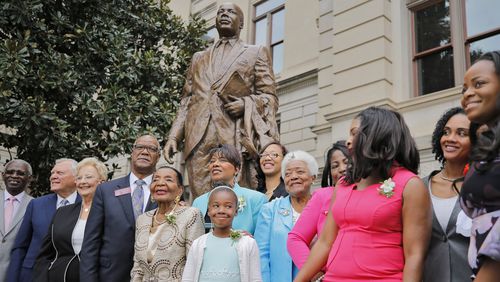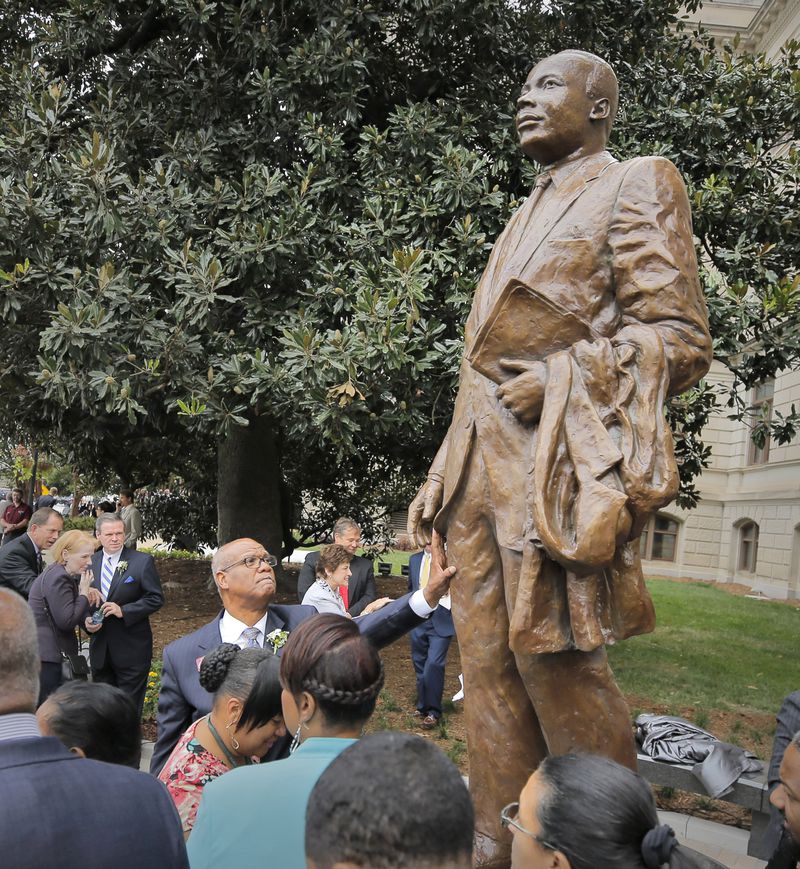The statue of the Rev. Martin Luther King Jr. now rises in the shadows of the Gold Dome, off the street named in his honor, directly across from the sparkling Liberty Plaza where demonstrators gather to make their voices heard.
King faces toward the east, positioned perfectly to welcome the dawn of every new day in Georgia, with a look of determination etched in his eyes. His legs are bent purposefully, but not quite midstride, as if he’s ready to spring into action.
“There is God in that,” Atlanta Mayor Kasim Reed said as he stood beside the statue and before a diverse crowd of thousands that included most of Georgia’s leaders, black and white, Democratic and Republican.
Following three tolls from the state’s replica of the Liberty Bell, the statue was unveiled Monday on the northeast corner of the statehouse grounds in a ceremony that even the state’s leaders admitted was long overdue.
Timed to the 54th anniversary of King’s famed “I Have Dream” speech, it came more than three years after Gov. Nathan Deal pledged to honor the iconic Atlantan at the Capitol — and decades of calls for a King memorial at the seat of Georgia’s political power.
With three generations of King family relatives on one flank and a phalanx of Georgia dignitaries on the other, the governor declared it symbolized the “evolved mind-set of our state as we continue to reconcile our history and our hearts.”
And as veterans of the civil rights movement looked on — former U.N. Ambassador Andrew Young sat front and center — the Rev. Bernice King nodded to the fraught debate about Civil War symbols ignited anew by the bloody violence sparked by white supremacists in Charlottesville, Va.
“It is apropos that today in the state of Georgia, which was once a Confederate state, that we are erecting a statue — and we are unveiling a statue, more importantly — to a man who represents liberty, justice, freedom, righteousness and equality,” said King, the youngest of the civil rights leader’s children.
This statue of her father, she added, “provides a sense of hope to a nation that is in turmoil once again.”
‘A defining moment’
It was a long time coming. King, an Atlanta native who made the city the heart of the civil rights movement, had until Monday a limited presence at the statehouse: an oil portrait on the Capitol’s second floor.
Even that honor sparked a fight. Shortly after he was elected governor in 1970, Jimmy Carter noted the lack of artwork depicting African-American leaders at the Capitol. When Carter unveiled King’s portrait in 1974, after a committee’s recommendation, the Ku Klux Klan marched in swirling protest outside the statehouse.
African-American leaders had long pushed for a more significant honor for King under the Gold Dome, in part to counterbalance the collection of Civil War symbols scattered across the complex.
There are statues, plaques, towering portraits and marble busts of Confederate military leaders and politicians on the grounds, including the statue of John B. Gordon, a former general, governor and senator who sits in full Rebel regalia atop a warhorse on the northwest corner of the statehouse’s grounds.
In late 2013, Deal quietly removed the statue of a white supremacist politician from the Capitol grounds, then months later traveled to Ebenezer Baptist Church on King Day to pledge to honor King’s legacy with a statue near the statehouse.
Though it had widespread support, the plan to honor King soon stalled. First, it was because of complicated negotiations with the King estate, then they were plunged into limbo after the original sculptor, Andy Davis, died after his motorcycle was hit by a pickup truck.
A new sculptor, Atlanta artist Martin Dawe, was tapped in June 2016, and sponsors helped pick up the $300,000 tab. State Rep. Calvin Smyre, a Columbus Democrat who has served more than 42 years in the Georgia House, pulled together the corporate and political will to cement the project.
“Today is a defining moment in our state’s history,” he said, surveying the crowd. “Let’s not squander it.”
His ‘time has come’
As a gentle breeze whipped through the crowd sprawled out along Capitol Avenue — police had cordoned off surrounding streets in a vise of tight security — dignitaries reflected with head-shaking sincerity on this overdue honor nearly a half-century after King’s assassination.
“This day took much too long to get here. Too many yesterdays have slipped by us — yesterdays we can never reclaim or change,” House Speaker David Ralston said, adding: “But we can learn and grow from them. We can rededicate ourselves to those ideals that lift all of us up together.”
Ralston recalled learning about the shooting from a transistor radio while scratching out schoolwork at his Ellijay home. To this day, he said, he evokes King’s teachings when he worries about unceasing examples of people “who cling to prejudice and whose hearts are filled with hatred.”
Out in the audience, those words tugged at the heartstrings of Dr. I.M. Spence-Lewis. Now a malarial researcher, she was a teenager when she was in the Washington audience 54 years ago for King’s most famous speech. She had but one reaction after Monday’s ceremony.
“I felt the threads of history today,” she said.
Gerald Durley was at the King speech, too, as a newly elected leader of a student civil rights group at Tennessee State University in Nashville. He would later be ordained as a minister at Ebenezer — where King once strode the pulpit — and later tend to the flock at Providence Missionary Baptist Church. He saw Monday as a fulfilling bookend to history.
“We’ve shed enough tears,” Durley said. “Today was joyous, it was fulfilling. And you know what? It was exonerating. It was an exonerating moment for all of us.”
Did he mean to say exhilarating?
“No. You know the saying, ‘good guys always finish last’? Well, this lets you know that when you are honest and transparent and justified, your time will come,” Durley said. “And today, Dr. King’s time has come.”
There are more freighted debates to come. Lawmakers are set to debate next year how to handle the more than 100 Civil War monuments scattered across the state. And descendants of Alexander H. Stephens, the vice president of the Confederacy, want to remove his statue from the U.S. Capitol’s Statuary Hall.
They were topics of conversation that many in the crowd, including the governor, wanted to hold for another day. As Reed said, Monday’s ceremony was about righting other past wrongs.
For too long, he said, black leaders had lobbied for the King monument to little avail. Every time they were urged to be patient, he added, it brought to mind King’s lesson from his “Letter from a Birmingham Jail” dispatch: Waiting often means never.
A smile crept across his face as he recalled that frustration.
“Never,” Reed said, “has become now.”
About the Author









